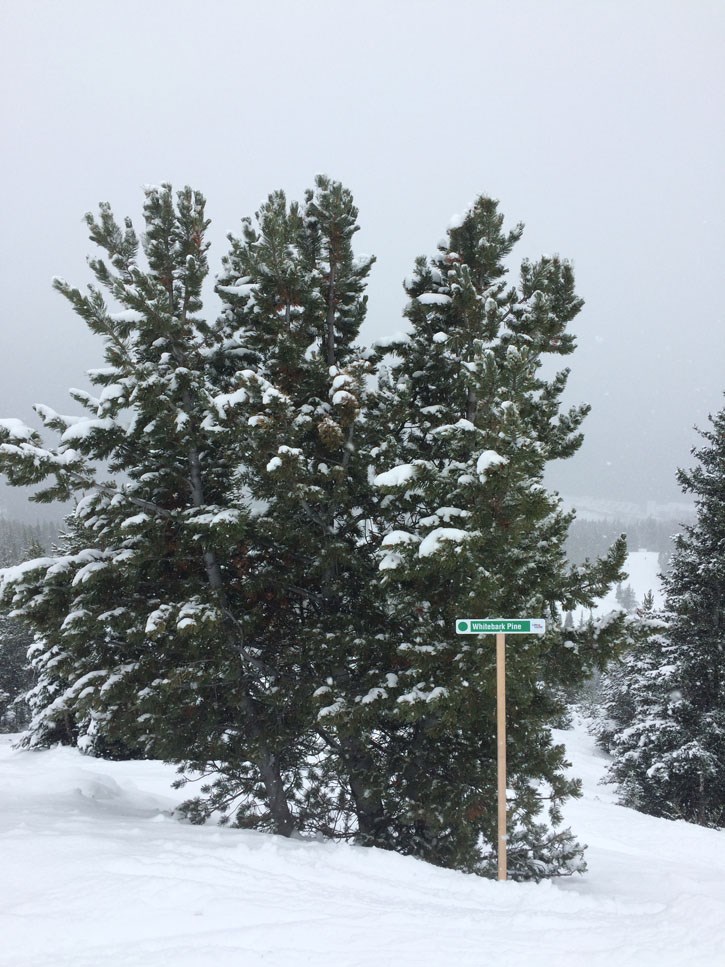LAKE LOUISE – The Lake Louise Ski Area admitted it made a mistake when its staff destroyed endangered whitebark pine trees in 2013, but the company was surprised last week when a Court of Queen’s Bench judge handed it a fine of $2.1 million as a result.
The ski area pleaded guilty in December 2017 to charges under the Canadian National Parks Act and the Species at Risk Act (SARA) to cutting down a patch of trees, including whitebark pine, between Aug. 12 and Sept. 23, 2013.
The charges related to the fact the company did not have the required permits in place to do tree clearing on the Ptarmigan Ridge, and that some of the trees destroyed were listed as an endangered species the year before and protected under SARA.
The case was legally significant, as it is one of the first to be prosecuted under that legislation and as a result lacked legal precedents in order to guide Justice Heather Lamoureux in her decision on sentencing.
In the end, Lamoureux found the ski area destroyed 38 whitebark pine trees, containing 58 stems and of those 19 were more than 40 years old and able to reproduce. As a result she fined the corporation $1.6 million. A further $500,000 fine was ordered against the company for the destruction of other tree species in contravention of the National Parks Act.
“As a result of the actions of Lake Louise Ski Area employees, there is a cumulative impact on the whitebark pine with potential risk of undermining the survival of the species in the decades to come,” Lamoureux wrote in her decision. “The court finds as a fact that there was a cumulative impact in terms of the impact on the ecosystem and that each cumulative impact may bring the species of whitebark pine closer
to extinction.”
The court heard testimony and arguments around sentencing for a week in July from defence counsel Alain Hepner and federal Crown prosecutor Erin Eacott. Key to the decision was how many trees were destroyed, how many were an endangered species and what mitigating or aggravating factors contributed to what happened.
“The judge accepted all of the Crown’s submissions regarding the quantum of the sentence, the remediation and the education initiatives,” Eacott said in an email to the Outlook. “The sentence is appropriate and a meaningful deterrent regarding impacts on species at risk, particularly for those operating in national parks which exist to protect our natural heritage.”
Hepner, on the other hand, argued against considering a fine amount based on a per tree number. He submitted to the court that an overall fine of $200,000 for the incident was appropriate given the circumstances.
In addition to the $2.1 million fine, which is contributed toward the Environmental Damages Fund, Lamoureux ordered Lake Louise to pay Parks Canada to provide whitebark pine seedlings for planting and remediation work on its leasehold.
There were also requirements in the decision for the ski hill to have an interpretation program that includes whitebark pine ecology, provide fact sheets to visitors, and identify trees on its leasehold with educational signage.
Lake Louise director of communication Dan Markham said the ski hill has already taken action to identify every single whitebark pine tree on the leasehold – 7,000 – and installed interpretive signage for visitors.
“There are an enormous number of things that have gone on in the ensuing years since the incident,” Markham said. “We took this very seriously, not just for whitebark pine, but every protected species at the resort.
“We don’t feel that was reflected in the decision.”
The size of the fine was also surprising for the company, Markham said, and the rationale provided by the judge was contradictory to what they feel was presented and agreed to in court.
“We are not sure the judge took into consideration things that were submitted in court,” he said. “When we heard those kinds of things in the rationale that were clearly wrong, we felt a need to appeal and we made the decision shortly after and will proceed with an appeal.”
Lamoureux found the fact Lake Louise was expressly warned by Parks Canada prior to the offence that whitebark pine had been listed as an endangered species an aggravating factor in the sentencing. She also found the fact that management knew for most of the summer that its trail crew planned to clear trees on Ptarmigan Ridge and failed to get the required restricted activity permit prior to the work being done a failure on the part of
the corporation.
“On the spectrum of culpability, the court finds that the Crown has proved beyond a reasonable doubt that the actions of Lake Lousie Ski Area and its employees were reckless given their knowledge of the constraints of operating a commercial ski hill in a national park,” she wrote.




